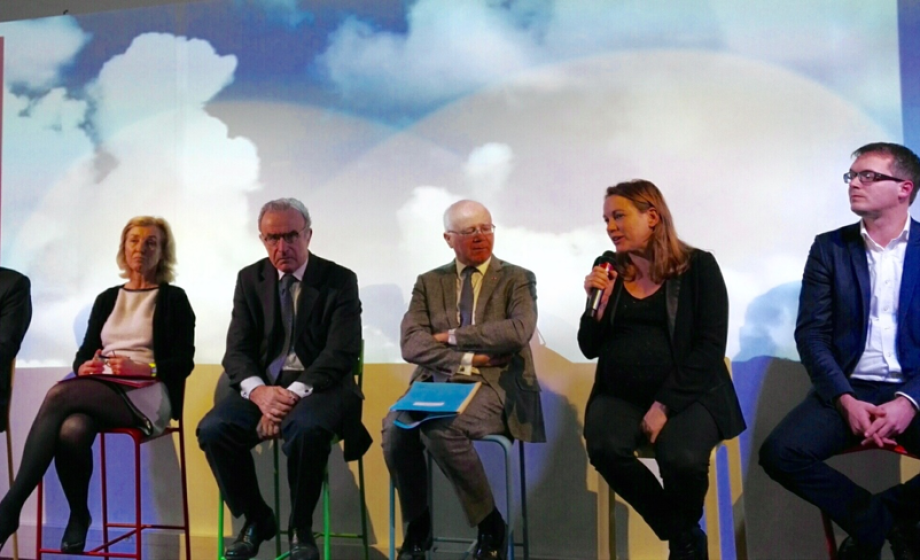
On November 18th, Secretary of State for Digital Affairs Axelle Lemaire invited the representants of the independent administrative authorities as well as the general data administrator at the digital innovation center NUMA in Paris to draw general conclusions around the online consultation of the Projet de Loi pour une République numérique. The discussion on the experience and the main challenges of the law involved in particular Henri Verdier, general data administrator, and director of Etalab, Isabelle Falque Pierrotin, President of the CNIL, Marc Dandelot, President of the CADA and Benoit Thieulin, President of the Conseil National du Numérique.
Enhancing democracy
Indeed, the bill for a French digital Republic (projet de loi Lemaire) has been opened in October for three weeks to a public consultation on an online platform where every citizen could contribute and propose amendments or modifications to the law. 21330 contributors have submitted over 8500 arguments, 200 detailed responses were given by the government to the contributors, and six contributions were adopted within the draft bill as it will be presented in January to the Parliament. This co-creational process of the law is fully integrated within the governmental strategy to evolve towards an open government based on more transparency, control, and citizen participation.
Targeting the downsides of the public consultation
If this type of online consultation has to be welcomed as a new way to conceive the public debate and to involve citizens within the law-making process, the particular context of a bill containing exclusively rights related to the digital economy with sometimes technical content reduces significantly the possibility for the large public to intervene. It’s all the paradox of this law: an extensive debate took place on a subject apprehended by a small fraction of geeks.
The discussion at NUMA was a perfect example of the difficulties a public consultation of this type engenders. Indeed, rather than interested citizens, who were not invited to this particular event, several public researchers were present to exert pressure on the government to push through Parliament article 9 of the bill providing the opening of public research material in anticipation of serious resistance expected from private editors during the debates. Benoît Thieulin, who was particularly consensual towards the government by stating that the law is a great advance for France and its digital economy, put attention to the fact that the co-construction of this bill was mostly embraced by a small minority of experts and that it is the role of the digital ecosystems to communicate more on these matters with the wider public.
The several intervenients insisted on the globally satisfying advances the law generates concerning especially net neutrality, the loyalty of platforms, data portability, and open data. Henri Verdier stressed the importance of a global open data principle inscribed within the law, creating a paradigm shift of crucial importance to allow more communication from public administrations and which matches the context of France’s upcoming presidency of the Open Government Partnership, a multinational project to enhance governmental transparency and open democracy.
Fostering start-up innovation
Regarding start-ups, the bill has to be welcomed for at least two reasons:
First, the open data principle makes it possible for startups to innovate and to make usage of a wide range of public data sets needed to develop their applications or services.
Second, data portability is essential for start-ups as well as every other business. It reinforces competition on the market because it facilitates switching from one provider or service company to another by not having to face adverse consequences regarding personal data. The same applies to the loyalty of platforms which is an essential feature of fair market competition, mostly for businesses in the developing process.
Freemium model for big data users ?
Asked whether the government envisages a freemium model for big data consumers or not, the Secretary of State Axelle Lemaire said this principle might apply as an exception to the principle of gratuity adopted recently within the loi Valter for big data users that absorb many data without resharing them on a free and open basis. Several measures are envisaged allowing all public administrations to contract with these companies and to make them pay for their important use of public data. An amendment could invoke this option during the parliamentary sessions. However, due to the numerous reservations local administrations have expressed when it comes to opening public data, such an undertaking might be difficult to implement, and the government did not want to give further details about this proposition at the current moment.
A successful experience raising desire for more
All in all, the different participants agreed on the fact that this first experience of a public consultation of this type was a large success, even if it was very time-costly and generated a considerable amount of work for all the actors concerned. Regarding the general slowlyness of the legislative process, it will technically be impossible to expand the co-creation of the law to every draft bill. However, it is the executive’s duty to expand this experience to several other laws and public debates of crucial importance to enter a new era of open government where citizens will again be more informed and thus included in the decision-making process, both on a local and on a national level. In this perspective, the projet the loi pour une République numérique marks undoubtedly a significant milestone in a new, progressive and modern approach of conceiving the democratic process.

